
The OBR's other duties
Some words plus some video and photos – what do the Volvo Ocean Race’s On Board Reporters do with all the rest of their day?
Back to basics and crucially they are not allowed in way to help sail the boat. According to Team Alvimedica’s OBR Amory Ross this means “essentially I am prohibited from doing any ‘performance enhancing’ activity. That means no driving, no trimming, no stacking, etc. Those are the big three. [In addition to my media work] my duties are the food – so nutrition and preparing the meals and the bars, etc. I love that actually. It is exhausting and it is a lot of work, but I treat it like my watch partner - it keeps me motivated and keeps me on a schedule and I love being able to help. It is something that makes me feel like I am earning my ticket.”
Amory’s daily schedule is really dominated by meal times, around which he carries out his duties as Alvimedica’s media man.
“My day starts at midnight when I pull out the food bag for that day. We have a decanter bag which sits at the bottom of the companionway every day. That contains Trail mix [ie dried fruit and nuts] and protein bars and vitamins. Starting at midnight, I’ll fill that for the next 24 hours.”
The daily food bag also includes ‘energy chews and bars’ and lots of savoury sweets and even some chocolate. “The idea is to always have something available that is somewhere between healthy and tasty. It makes a big difference.”
Food for the day is typically stored in a Esky (cool box) ready for meal times, which on board Alvimedica are at 0400, 1200 and 2000. This remains constant as the ship’s clock changes - which will be significant for leg five across the Pacific section of the Southern Ocean when over the course of the leg they start on Auckland time (UTC +13) cross the International Dateline and end up on Brazil time (UTC -2).
And ship’s time is usually different, and sometimes significantly different, to that of the OBR’s masters back at VOR HQ in Alicante where they are typically operating to accommodate North America and Europe deadlines. “Fortunately I have the food as an anchor and keeps me pretty grounded on board and it is nice thing to look forward to,” says Amory.
Typically the crew eat either before or after their watches: “The first meal - depending on where we are in the world, whether it is hot or cold and whether the guys are working hard or not - will either be a bag of cereal or muesli/granola or a full freeze dried meal. So for example – the first leg, the first two thirds of it was cereal and muesli and the last third in the South Atlantic when the weather deteriorated and the guys were working pretty hard and burning quite a few more calories, we shifted to three freeze dried meals/day.”
Apparently how food for these freeze-dried meals is prepared varies from boat to boat. On some they make big batches for all the crew, while on others (like Abu Dhabi Ocean Racing) they have single serving satchets for each individual crew.
“The way I did it on Puma, and the way I am most comfortable with it, is to make just one big batch,” says Amory. “We have got a pretty solid set-up with the cooler to keep it warm and if, for whatever reason, it loses a lot of heat, it is easy to boil up some water and add to it.”
‘Getting the best from your freeze dried’ is something of an art. Fortunately it has improved considerably from the wind-inducing tasteless porridge of years gone by. On Team Alvimedica they take freeze dried meals from three different companies - Back Country, Mountain House and Fuizion. Plus they carry condiments on board to spice up the food – typically BBQ sauce and ketchup.
“They are all a little bit different,” continues Ross. “Fuizion is generally a bit spicier - like Chicken Jalfrezi and Green Thai Curry. Mountain House are more your basic spaghetti in meat sauce and everyone loves the Back Country from New Zealand - roast lamb, Mexican chicken, etc. Fortunately I learned a lot about these things in the last race and during training we figured out what the guys like and what they don’t like, so now we have got a pretty confirmed roster of food and enough diversity. I think on leg one we only had one repeat meal, so we have done a good job at keeping things spread out. It’s always good to surprise the guys with a good meal.”
To prepare a batch for all the crew requires two and a half kettles full of boiling water to be added to the dry freeze dried mix. Crucially this is then left to soak for 45 minutes with Master Chef Ross adding some olive oil and carrying out a lot of stirring. This part of the process is vital for ensuring that on the one hand the meal isn’t overcooked, turning into sludge, nor on the other, if it is inadequately soaked, creating a ‘more lively’ passage through each crewman’s digestive tract.
With all the preparation, soaking etc it typically takes around one and a half hours to prepare each meal, although during the soaking time, Amory says he usualy goes off and come back from time to time to give the mix a stir to ensure that freeze dried is rehydrating properly. “It sounds simple adding boiling water to food, but if you don’t pay attention and do what it needs, you can really mess it up and in a dangerous way. If you feed someone a meal that is not quite hydrated enough it can suck all of the moisture out of the body.” Even with all the soaking, the latest freeze dried still remains quite wind inducing.
The crew have their say in what food is taken on board, but ultimately this is Amory’s decision. “The buck stops with me and they know that - it is one of the things I can own on board. But it is impossible to please everybody.” This means that one of his pre-race jobs is not only to decide the food that will be taken on each leg, but to pack all the food bags.
In addition to all this, when they set out on a leg they will carry a small amount of fresh food, typically including fruit, cheese, prosciutto and beef jerky. However Amory says that it doesn’t keep well in the generally humid conditions on board or the hot (the first four legs) weather. There is a tendency for this food to get crushed when the boat is moving out or there’s stacking going on.
Amory is also chief tea boy and tea and coffee are both readily available to the crew. “We have containers in the galley, one for protein powder, one for cappuccino and powdered milk for the cereal or your tea. We have got a bag for the tea. Will [Oxley] is the big tea guy! And Jono [Swain on Puma] in the last race too. I understand the value of a little bit of milk in your tea.”
A less obvious aspect of the food has come about with the change from the VO70 to the new one design VO65. The VO70s had more inherent righting moment and so the onus was on making everything as light as possible (including the food) whereas this time the VO65s are comparatively tender and so stacking weight it more important. There was even talk of putting a maximum weight limit on the food bags and media equipment because any additional righting moment is deemed to be valuable.
As a result at present only the food for each individual day can be stacked (even as head chef Amory isn’t allowed to stack the food) whereas the remainder of the food must be left in the special bins for the food bags located aft of the daggerborad cases.
Water
Vital to all these processes is of course water and for this they rely on the on board desalination plant which on Team Alvimedica is typically run twice a day. How this happens has been through something of an evolution, as Amory explains: “In the last race it was a bit of an issue, because if I was preparing the food and ran out of water then I’d either have to go and get someone on deck or wake someone up. Last time everyone was nervous letting the camera guy play around with the charging. Now it [the watermaker] is off the battery, but we are also allowed to charge the batteries as well as to run the watermaker.”
Typically they run the watermaker long enough to fill the tank, but water consumption varies. When it is hotter, as it is now, then the crew consumes more. “I try hard to get the guys to drink as much as possible. We have electrolyte tabs and all kinds of rehydration products.”
Sleep
Somewhere in this mix, it is necessary to sleep. Usually Amory says he tries to get his OBR duties completed by 2200 and then he sleeps until midnight when it’s time to pull out the next day’s food bag. Once it’s all decanted, he goes back to bed from around 0030 to 0230, when it’s time to start boiling up the water to get breakfast underway.
“Sleeping is one of those things that you get used to missing out on. Typically I get 4.5 to 5.5 hours/day. When it gets light and there is not a lot going on and you can hop up on deck and down pretty quickly, you can easily get more than that, but when it is rough and all of a sudden everything you do takes twice as long - maybe it’s cold and the meals take twice as long to boil, sleep time gets really small. If you are tacking up a coast line or something, the sailors talk about not sleeping and it is the same with the OBRs – you are tacking from bunk to bunk and swinging your media stuff around or maybe you are trying to film it all. The sleeping schedule varies greatly from day to day.”
Lucky Amory is also allowed to take part in the cleaning and the bailing, although he expresses some relief that this isn’t solely his responsibility. “We try to get everyone involved and wanting to keep the boat clean. It is a tough thing to motivate yourself to do but I think we all see the importance of keeping the boat tidy and being just generally good with hygiene. With that job I am part of a rotation, otherwise I do what I can - if we have been on one tack for a while and we have got a tack coming up, I’ll boil some water and attack the leeward bilge with some Clorox [bleach] and a sponge, so things are nice and clean when we flop over. But everyone contributes - we don’t have to work too much to get people to help out with that.”
And of course no two days are ever the same. “Some days it feels like all you are doing is bailing and then there are others when you go down to edit and you have three hours of footage and maybe the light has been beautiful or it’s been really nice shooting conditions and you can’t do anything but shoot. Obviously those are the more entertaining days because you love what you do and telling a story is a lot of fun, but then you find yourself with way too much to edit. There is always balance. Every day is unique.”

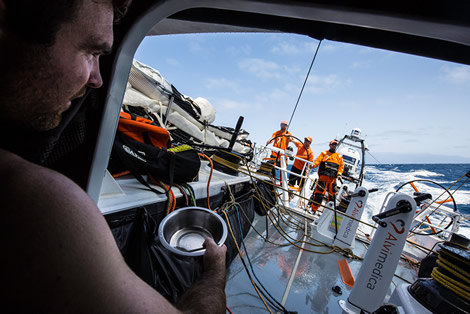
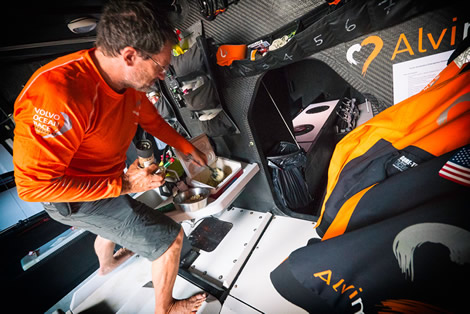
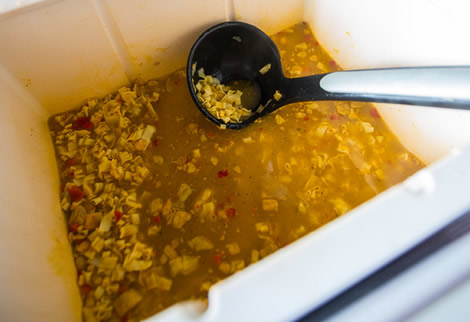
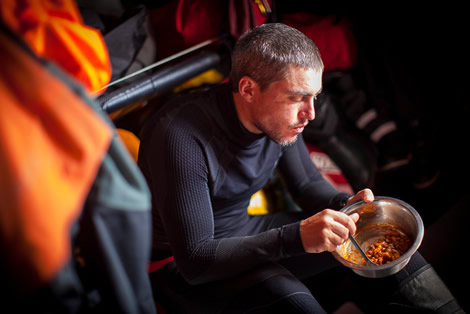
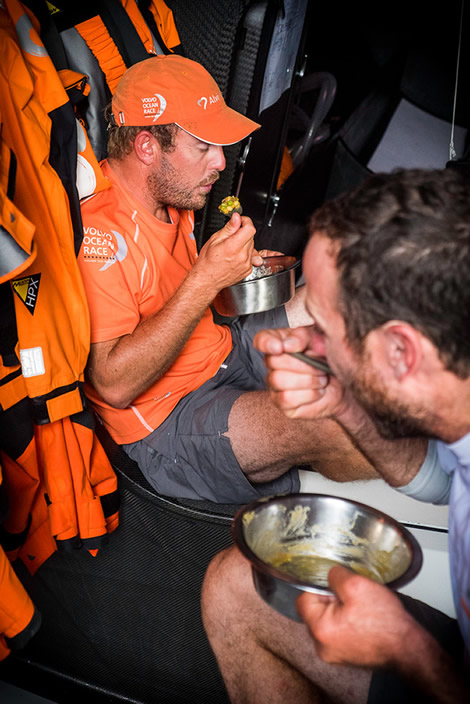
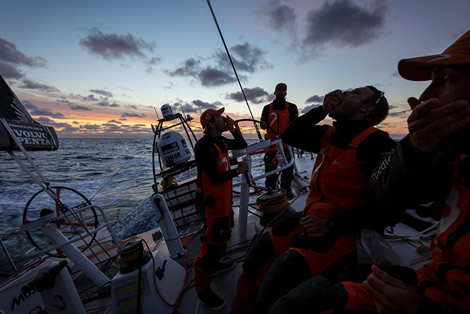
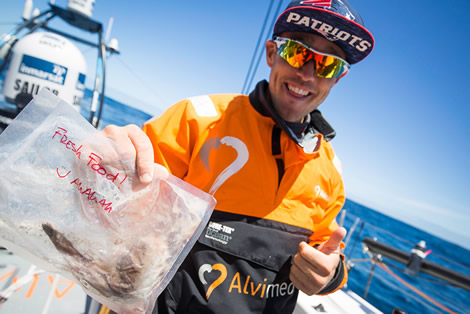
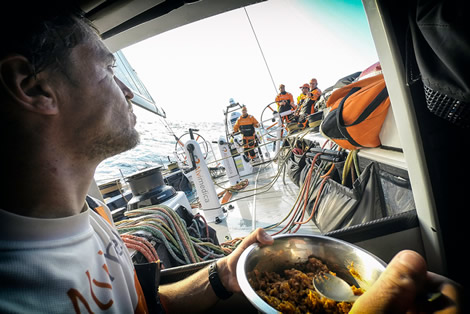
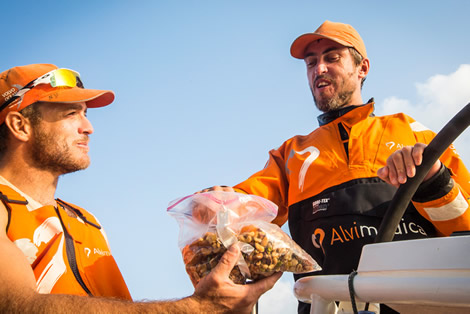
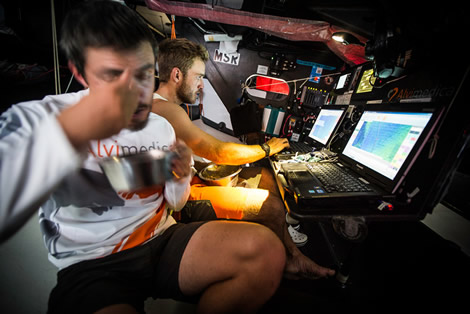
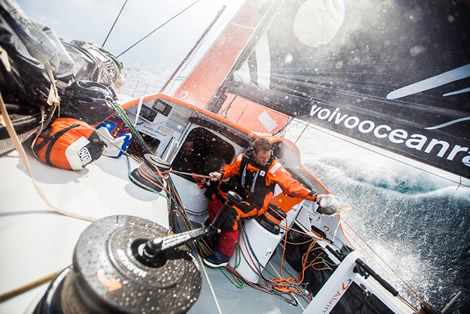









Latest Comments
Add a comment - Members log in